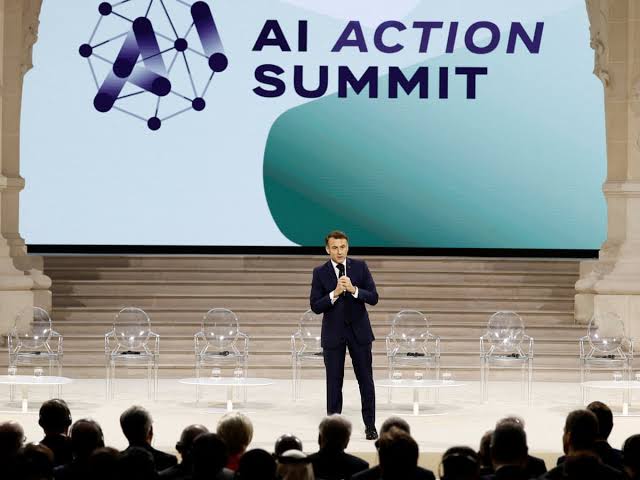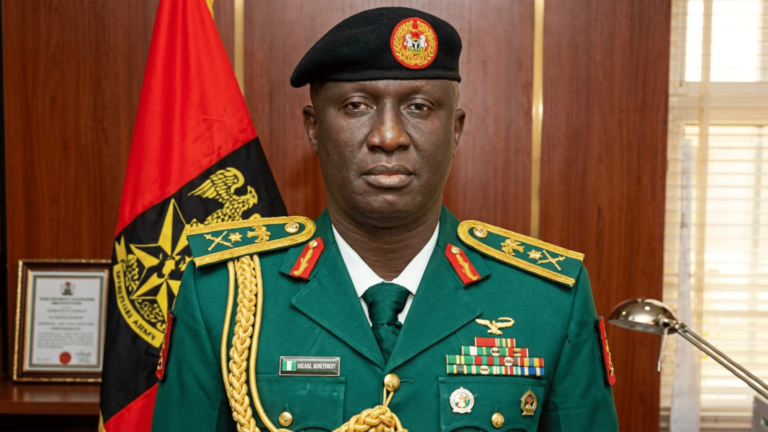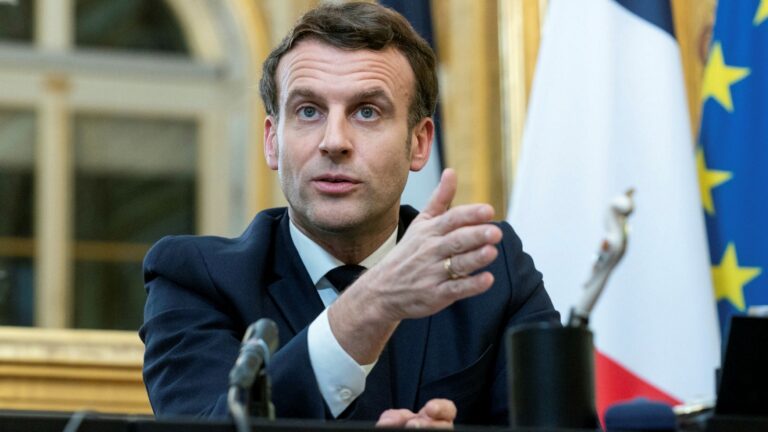
World leaders and technology executives convened under the impressive glass ceilings of the Grand Palais in Paris for a two-day summit focused on artificial intelligence. The venue, strategically located between the Seine River and the renowned Champs-Élysées, was arranged like an exhibition space filled with numerous displays highlighting the diverse applications of AI.
As attendees ascended the grand staircase in the building’s stunning nave, a vibrant array of flags adorned the railing, representing the various nations participating in the summit. At the summit’s conclusion on Monday afternoon, several prominent figures gathered in the VIP lounge to deliberate on the potential effects of AI on democratic systems.
However, some notable VIPs were absent. Key representatives from leading companies in the industry, such as OpenAI, Google, and Microsoft, were notably missing from the discussions.
Meredith Whittaker, president of the end-to-end encrypted messaging platform Signal and a former Google employee who played a significant role in organizing mass protests over the company’s approach to AI ethics, criticized their absence. Whittaker resigned from Google in July 2019 after a decade with the company.
Security threats
AI significantly impacts our personal lives, Whittaker noted. To emphasize her argument, she pointed to the few telecommunications companies in the United States, such as Verizon and AT&T, that were compromised during a large-scale espionage operation linked to China, known as Salt Typhoon, which occurred last December. This incident resulted in the collection of extensive metadata from US users, with individuals connected to both Kamala Harris and Donald Trump’s campaigns being specifically targeted in the lead-up to the November presidential elections.
“From a security perspective, the outcome was catastrophic. This breach was facilitated by backdoor programs—tools that enable unauthorized access to computer systems or encrypted data—that were installed by authorities who were supposed to be the only ones with access,” the president of Signal elaborated.
Whittaker posits that AI emerged from a surveillance-driven business model, asserting that in the realm of hacking, “data can be weaponized” against the democratic framework of the United States.
Latvian President Edgars Rinkevics echoes these sentiments, recognizing the significant threat posed by cyber activities. He elaborated on how Latvia’s unique geopolitical and geographical context has rendered it vulnerable to cyber-attacks and disinformation efforts in recent years. With Russia as a neighboring country, Latvia, along with Estonia and Lithuania, has faced numerous cyber incursions. In 2024, EU member states have once again found themselves under the assault of Russian cyber operations.
Before detailing the specific challenges confronting Latvia, Rinkevics emphasized the importance of safeguarding critical infrastructure and closely monitoring the Baltic Sea, where several undersea telecommunications, power, and data cables have been compromised in recent months.
Regarding the impact on democracy, Rinkevics noted that AI has been utilized to interfere in elections, particularly in Romania. In response, Latvia has enacted legislation mandating that all AI-generated content be clearly labeled, enabling citizens to recognize its use. Rather than approaching the technology with trepidation, Rinkevics advocates for enhanced expertise to accurately trace the origins of cyber threats and to fortify democratic institutions.
In a significant move, Latvia entered into a partnership with Microsoft in December of the previous year to establish a National Center for Artificial Intelligence, aimed at advancing AI and other digital innovations to streamline the nation’s administrative functions.
Need for global AI safeguards
Artificial intelligence presents a range of challenges, from disturbingly precise deep-fakes to social media profiles hijacked by fraudsters seeking financial gain. This multifaceted nature of AI contributes to its potential danger to democratic systems. Marie-Laure Denis, President of the French Data Protection Authority (CNIL), cautioned that “AI can facilitate cyber-attacks, which have evolved in sophistication due to the availability of tools capable of generating intricate code for malicious purposes.”
Denis asserts that the protection of democracies should be rooted in a variety of safeguards, beginning with the General Data Protection Regulation (GDPR), which has been in effect in the EU since 2018. This regulation outlines the protocols for collecting and processing personal data from individuals both within and outside Europe. “We need to create a reliable AI tool to enhance the safeguarding of our rights,” she emphasized. “Without assurances, trust cannot be established. And without trust, the long-term development of AI is not feasible.”
However, regarding AI and democracy, not all nations feel adequately represented in the regulatory discussions. Pakistani lawyer and digital rights advocate Nighat Dad highlighted the global inequalities. “Are our discussions at this roundtable truly democratic? Are we addressing the entire world or merely the democracies of the Global North?” Dad inquired. She established the Digital Rights Foundation in 2012, an NGO dedicated to defending human rights advocates in digital environments. “Progressing without a range of perspectives is inconceivable. All democracies must have the opportunity to voice their opinions.”
Mathias Cormann, the secretary-general of the OECD, supported Dad’s comments by emphasizing the necessity for “more effective international collaboration on AI.”
“We require a comprehensive governance framework to facilitate the development of safe AI,” he stated. “Currently, we are far from achieving that.”
“At this point, we are uncertain about the future direction of AI,” concluded Latvian President Rinkevics. “The primary focus for companies is to capitalize on the advantages of AI. Meanwhile, the priorities for nations may differ somewhat. Regardless, we are still quite distant from establishing a global AI agreement.”



